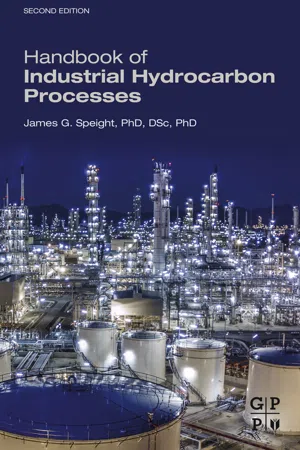
- 806 pages
- English
- ePUB (mobile friendly)
- Available on iOS & Android
Handbook of Industrial Hydrocarbon Processes
About this book
Handbook of Industrial Hydrocarbon Processes, Second Edition, provides an analysis of the process steps required to produce hydrocarbons from various raw materials and how the choice of a process depends not only on technology, but also on external effects, such as social and economic developments, political factors affecting the availability of raw materials, and environmental legislation. This book qualitatively examines chemical processes and plant design by showing the factors determining process structures, including the underlying chemistry, feedstock, product specifications and reactor design. The book also compares the processes for different products based on raw materials and manufacturing processes based on their respective applications.With the addition of useful flowcharts that present an overview of the chemical processes, process design and equipment, this book is a valuable resource to industry professionals on how to understand how hydrocarbons are produced from different raw materials and how to develop an instinct for the right process development strategy.- Provides a qualitative analysis of chemical processes and plant design by showing the factors determining process structures- Presents chemical processes in an organized, easy-to-read and understandable manner with the use of useful flowcharts and concise descriptions- Includes updates on changes in existing technological and chemical processes, as well as possible future improvements or changes to other more economic or more readily available feedstocks
Frequently asked questions
- Essential is ideal for learners and professionals who enjoy exploring a wide range of subjects. Access the Essential Library with 800,000+ trusted titles and best-sellers across business, personal growth, and the humanities. Includes unlimited reading time and Standard Read Aloud voice.
- Complete: Perfect for advanced learners and researchers needing full, unrestricted access. Unlock 1.4M+ books across hundreds of subjects, including academic and specialized titles. The Complete Plan also includes advanced features like Premium Read Aloud and Research Assistant.
Please note we cannot support devices running on iOS 13 and Android 7 or earlier. Learn more about using the app.
Information
Chemistry and chemical technology
Abstract
Keywords
1. Introduction
2. Organic chemistry
Table of contents
- Cover image
- Title page
- Table of Contents
- Copyright
- About the Author
- Preface
- Chapter 1. Chemistry and chemical technology
- Chapter 2. Sources of hydrocarbons
- Chapter 3. Hydrocarbons from crude oil
- Chapter 4. Hydrocarbons from natural gas and natural gas hydrates
- Chapter 5. Hydrocarbons from coal
- Chapter 6. Hydrocarbons from oil shale
- Chapter 7. Hydrocarbons from biomass
- Chapter 8. Hydrocarbons from synthesis gas
- Chapter 9. Chemical and physical properties of hydrocarbons
- Chapter 10. Combustion of hydrocarbons
- Chapter 11. Reactions of hydrocarbons
- Chapter 12. Petrochemicals
- Chapter 13. Pharmaceuticals
- Chapter 14. Monomers, polymers, and plastics
- Chapter 15. Hydrocarbons in the environment
- Conversion Factors
- Glossary
- Index